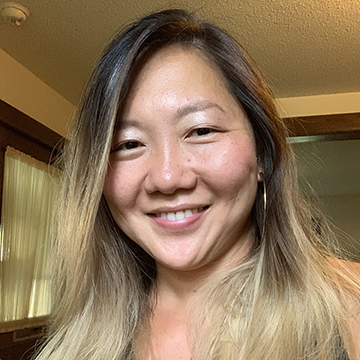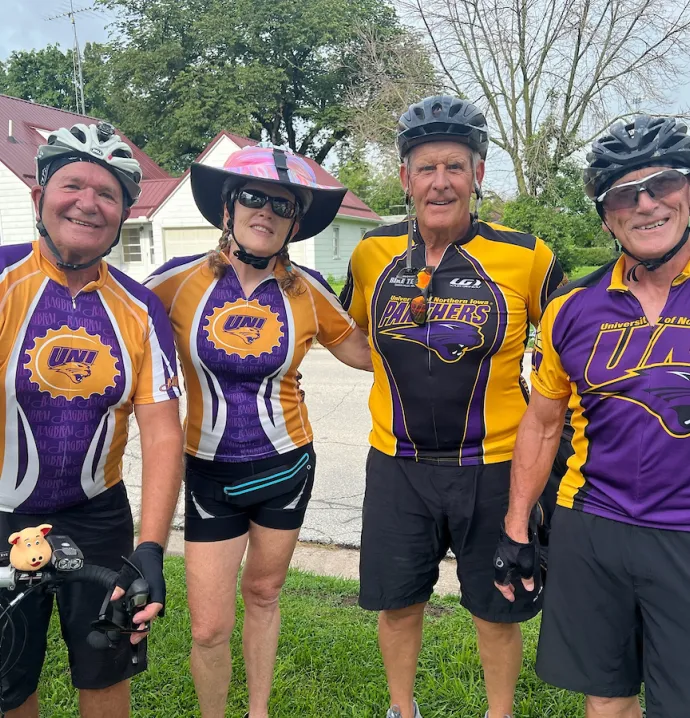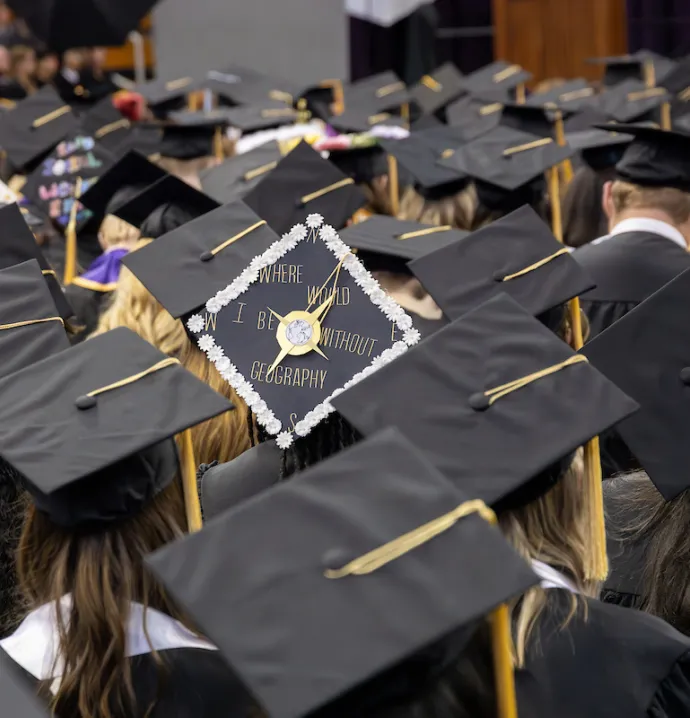Creating circles to heal
Creating circles to heal
Angela Waseskuk was only in kindergarten, and the third grade boy had backed her up against a wall and was yelling in her face.
Waseskuk was a shy child, trying to blend in as a South Korean brought to Iowa by her foster parents, who adopted her when she was 2. But she was out in the open and in tears as the boy hurled racial epithets.
“What’s wrong with your face? Can you even see out of those eyes? Why don’t you go back where you came from?”
It was a moment that helped set her on a path of passionate advocacy for racial and social justice issues, which eventually led her to the University of Northern Iowa, where, as an instructor in the art department, she immersed herself in campus and community issues while being a champion for indigenous and Asian American and Pacific Islander students.
Now, Waseskuk, 40, is helping lead a project that will give people who have experienced racism or other trauma a safe place and a captive audience to hear their story and help the community grapple with systemic racism.
Gather to Grow: A Cedar Valley Story Circle Project is a UNI Imagining America initiative to provide the tools and opportunities for citizens of the Cedar Valley to grow together through a shared experience of telling and listening to personal stories in small groups called story circles.
“This is a way to give people a platform to share their stories and to have conversations that may be challenging, but are healing as well,” she said.
Waseskuk knows the benefits of sharing your story, because she kept the kindergarten accident buried for years.
“That moment was the first time I experienced racism. I was surrounded by other kids and teachers and no one did anything, no one said anything,” Waseskuk said. “That was the moment I knew I was different, and that for some people, that was a bad thing.”
Waseskuk said it wasn’t until she was an adult that she felt comfortable discussing it. Waseskuk remembers the first time she told that story from kindergarten, and it was a powerful experience, one she hopes other participants in the story circles will share.
“I continued to reject that story growing up and trying to assimilate to the spaces I was in. But actually being able to acknowledge it and kind of take ownership of it was important,” Waseskuk said. “It has helped me to grow both in telling my own story, but then being able to hear other people's experiences as well.”
The story circles range from eight to 12 participants, who are allotted to two minutes of uninterrupted time to share a story. The sessions are conducted virtually.
Gathering to Grow is an offshoot of Imagining America, a national consortium of higher education institutions that address social justice issues and work towards societal betterment through the arts and humanities. UNI has been a member of the group for three years, and the Gather to Grow project emerged from this local chapter.
The project received funding from the Cedar Falls Art and Culture Board and UNI’s Center for Multicultural Education to provide honorariums to four different artists, who would create art inspired by a story circle they would each host. Three of those works of art were shared at the Cedar Valley Illuminate Art and Light Festival.
“It started around the feeling that we needed to address racism in the area locally, and acknowledge that racism exists in our own communities,” Waseskuk said. “But it can also be about really any kind of social justice type issue. It's really about the opportunity for people to feel empowered to tell their own story,”
One of the artists brought into the project was spoken word artist Kei-Che Randle, a Black, deaf woman who advocates for bridging the gap between the deaf and hearing communities through music and dance.
Her contribution to the Gathering to Grow project was a spoken word poem “Say Her Name,” which integrates American Sign Language with Slam Poetry. It’s inspired by a Black Lives Matter poem she wrote years ago and describes her experiences with racism and prejudice.
“Say Her Name is about my experience and how I want the Cedar Valley community to speak up when it’s their turn not to abuse,” Randle said. “Being a deaf, Black woman- I may always need advocacy from others. However, that doesn’t stop me from using my voice.”
Randle’s spoken word piece was performed via video at the Cedar Valley Illuminate Art and Light Festival in May.
This iteration of the project recently ended, but Waseskuk said she hopes it will continue to grow.
“We really love having an artist that is creating something out of people's stories. Hopefully, we'll have a new chapter with new artists moving forward.”
Working on diversity projects at UNI is not new for Waseskuk. She worked closely with UNI’s efforts to better partner with the Meskwaki community that resulted in new scholarships, reinstating a summer school program and jointly developing a statement acknowledging that the university campus sits on the traditional homeland of the Meskwaki and other Indigenous peoples. This work includes serving as chair of the Land Acknowledgement and Stewardship Statement Work Group and sitting on two additional work groups focused on UNI and Meskwaki Nation partnerships.
She is also involved in a community project to create an adaptive reuse and vision plan for the historic Walnut St. Baptist Church in Waterloo, alongside Iowa Heartland Habitat for Humanity, Walnut Neighborhood Coalition. Link Christian Community Development, Imagining America at UNI and UNI's Institute for Decision Making.
She also serves as an informal advisor for indigenous students working to form a First Nations Student Alliance and to Asian American and Pacific Islander students as well.
“This is daily work that every single one of us at UNI is responsible for, no matter our role or department,” Waseskuk said. “The fight for inclusion, equity, equality and justice is our moral imperative as an institution of higher education, an ongoing fight that requires everyone's engagement. If you're getting your hands dirty, then there's always an opportunity for growth.”
Waseskuk graduated from UNI with a Bachelor of Fine Arts in painting in 2003 and was hired as faculty member in 2009 after completing her master’s degree in sculpture and dimensional studies at Alfred University in western New York.
Waseskuk grew up as an orphan in South Korea and was adopted by her Iowan parents when she was 2 and grew up in Cedar Falls.
Art was something she always gravitated towards as a child.
“I've always loved drawing and making things out of paper,” Waseskuk said. “I don't remember a time when I was not doing that.”
When she came to UNI, she started taking art classes, but was uncertain if it would become a career.
“I felt like it was a temporary decision – that maybe I would figure something else out,” Waseskuk said. “But I always came back to it and really, really loved it. I had amazing faculty, and I started looking at art in a much different way and, and realized that it was my passion.”
She was an artist in residence at the Hartman Reserve Nature Center, where she experimented with dyes derived from local plants. She said the experience helped connect her to the Midwest.
“Even though I was raised in Iowa, I felt disconnected,” she said. “Being able to connect with the local ecology was a new kind of tether for me, and it felt like I was connected in a new way.”




